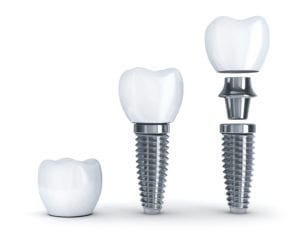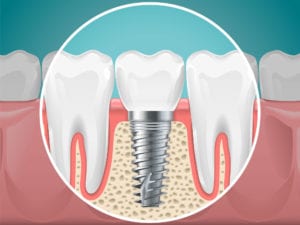Dental Implants Springfield & Longmeadow, MA Dental Implants Springfield

A dental implant looks like a natural tooth cosmetically, helps retain the bone structure of the jawline, and offers a tooth implant that is permanent and secured in the jawbone, just like natural teeth. Dental implants are also easy on surrounding teeth because they are anchored in the bone and don’t need to be attached to neighboring teeth. Dental implants in Springfield, MA, from Taylor Street Dental, are among the most comfortable teeth replacements, offering a high quality of life, comfort when talking, and ease of eating and chewing.
What is a Dental Implant?
The dental implant is named for the titanium implant that replaces the natural tooth root. This tooth implant is secured into the opening formerly occupied by the tooth root. In certain cases, a bone graft is done to help stabilize the implant in the bone for a more solid connection. After the dentist implants the titanium base, the jawbone then grows around and accepts the implant, making it become part of the jaw. We then attach a post to the implant, and a custom-made artificial tooth (a crown) is placed on top of the post. Your new artificial tooth feels and functions just like a natural tooth because it is rooted in the jawbone, just like a natural tooth. Once the area around the dental implant is healed, you won’t even notice it is there most of the time because it is so comfortable.
Why Should I Replace a Missing Tooth?

Most people plan on replacing a tooth, whether it had to be extracted or was avulsed from some sort of trauma. But as time goes by inertia builds and they no longer want to commit the time or money to replace the tooth. That’s a bad idea for a number of reasons:
- First, your teeth stay in place thanks to the pressure placed upon them by the teeth on each side. When a tooth is missing, the adjacent teeth tend to slide over into the gap, now that the pressure to stay put is gone. This can create havoc with your bite and the overall alignment of your teeth.
- Second, natural teeth help keep the jawbone beneath them healthy. This happens because when you bite and chew, there is a tremendous amount of energy exerted. That energy travels down the tooth into the jawbone beneath it, and this energy triggers the jawbone to create new bone cells. This process keeps the jawbone healthy and continually regenerating. When a tooth or teeth are missing, the jawbone under the gaps begins to erode and lose bone mass. That’s why people missing many or all of their teeth can have a sunken appearance to their face.
- Third, with gaps in your teeth, chewing certain foods, such as fruits and nuts, can be difficult, so you avoid them. This can create gaps in your diet to go with the gaps in your teeth. Additionally, difficulty biting and chewing means that you won’t enjoy eating as much and likely won’t be able to eat some of your favorite foods.
Ideal Candidate For a Dental Implant
To place a dental implant the patient has to have sufficient jawbone mass. If you’ve been missing a tooth or a few teeth, you may have lost some of that jawbone mass. In that case, we would have to build up your jawbone with bone grafts prior to starting the implant procedure. Otherwise, just about anyone is a great candidate for implants.
What is the Difference Between Porcelain Veneers and Dental Implants?
Porcelain veneers are strictly a cosmetic procedure. Veneers are thin shells of porcelain that are placed over the front surfaces of your visible teeth to mask imperfections or deep staining and make your smile look perfect. Veneers do not correct deep cracks, decay, or other problems with the actual health of the teeth. Veneers also usually have a lifespan of 10-15 years. Because a small amount of the enamel on the front surfaces of the teeth needs to be removed to make room for the veneers, once a set needs replacing, you’ll have to have another set to replace it. Your teeth with the shaved-down enamel cannot be left uncovered and unprotected, or they will become more damaged.
Dental implants are the best option for the replacement of a missing tooth or a tooth that is so badly damaged or decayed that it needs extraction. Dental implants are anchored by the titanium teeth implant base, which is screwed down into the jawbone. The jawbone then grows around the implant, making it part of the jaw. A post is attached to the implant, and an artificial porcelain tooth is attached to the post. Because of this, dental implants function and feel just like natural teeth. Implants can also be used to anchor bridges or full arches of dentures. Unlike veneers and other tooth replacement methods, dental implants will usually last for the patient’s life.
The Difference Between Dentures and Implants
Dentures, whether full or partial, are also meant to serve as tooth replacements. Partial dentures consist of a series of teeth and are sometimes referred to as bridges. Crowns placed on the teeth on each side of the gap are used to anchor bridges. Full arches of dentures replace all of the upper or lower teeth.
Traditional sets of full dentures work as a single prosthetic with attached upper and lower teeth. The problem with these dentures is that they are not anchored but sit on top of the patient’s gums. This causes problems with slippage when the patient is eating or talking. Full dentures also do nothing to stop the erosion of jawbone mass that occurs when a person is missing many or all of his or her teeth. The jawbone doesn’t receive the energy it receives from the natural teeth when a person chews, so it deteriorates over time. Dentures, because they aren’t anchored into the jawbone, don’t deliver this energy into the jawbone, so it continues to deteriorate. This is why traditional dentures need to be refit periodically.
The best dental implants replace teeth on an individual basis. Each dental implant acts as a single tooth. Because they are anchored into the jawbone, as described above, implants function just like natural teeth. This means the patient can eat anything he or she wants, and there will never be any slipping, as happens with dentures.
Dental implants are not a practical solution for a person missing all of his or her teeth, but they do a great job as anchors for full arches of dentures. Four to six implants are placed on each arch, but instead of an artificial tooth attached to the post, anchoring implants simply have a post with a ball on top. The full arch of artificial teeth then has sockets that snap onto the implant balls. This gives the artificial teeth stability that is lacking in traditional dentures. Plus, the implants send energy down into the jawbone, helping stem bone loss.
How Are Dental Implants Placed?
Once your jawbone is deemed healthy enough to receive the implant, the process involves four steps:
- Placement — The first step is to make a very tiny incision in your gums and screw the titanium implant down into the socket of your natural tooth root.
- Osseointegration— Next, the jawbone needs to grow around and accept the implant. This is called osseointegration and usually takes from three to six months.
- Healing Abutment — Once osseointegration is complete, the next step is to place a healing abutment into the implant. Once placed we let the gums heal around it for around four to six weeks.
- Crown — The final step is to attach your artificial tooth, called a crown, to the abutment post. The abutment and crown are customs made to match the color of your adjacent teeth and to match the shape of the natural tooth that was in that position. From the outside, no one can tell that you have any kind of artificial teeth replacement.
Will my Implant Look and Feel Natural?
Dental implants feel and function just like natural teeth. They don’t require any special cleaning methods or care. You can eat whatever you like with them, and no one can tell your implant from the tooth next to it. Plus, as with a natural tooth, the implant transfers energy down into your jawbone, keeping it healthy.
Can Dental Implants Stain?
At Taylor Street Dental, we make artificial teeth used with implants from dental porcelain. Dental porcelain is highly resistant to staining, far more resistant than natural tooth enamel.
Are Dental Implants Painful?
Receiving a dental implant is not a painful process. Yes, you will have some gum recovery when the implant is placed into your jawbone. This can be handled with over-the-counter pain medication. You may have some minor aching from the implant placement. Then there is another shorter period of gum healing when the post is attached to the implant. When the artificial tooth is added at the end, there isn’t any pain or recovery whatsoever.
What if I’m Missing a Number Of Teeth?
While dental implants can be used to replace any number of missing teeth, it may prove too costly to replace every missing tooth with an additional implant. In these cases, we use strategically placed teeth implants to serve as anchors for permanent bridges or for full or partial dentures. Implant-supported dentures are stronger than traditional dentures, they are more comfortable and longer lasting, and they usually do not loosen like traditional dentures do.
How Long Will a Dental Implant Last?
Dental implants can last the rest of the patient’s life. Your dental hygiene will play a role in longevity, but as long as you brush and floss daily and see the team at Taylor Street Dental for recommended cleanings and exams, your dental implant should last for decades. Of course, if you do not take care of your implant or crown, it will shorten the lifespan of your dental implant.
What are The Advantages of Dental Implants?
At Taylor Street Dental, we believe dental implants are far and away the best option for replacing a missing tooth or even a few missing teeth. Implants have numerous advantages over other teeth replacement options, such as dental bridges:
- Implants function just like natural teeth because they are anchored into the jawbone, as your natural tooth roots are.
- Implants have no restrictions on what you eat — chewy foods, caramel apples, whatever. With a bridge, you need to avoid some foods that can damage the bridge.
- Implants are the longest-lasting dental restoration. Dental implants usually will last the remainder of the patient’s life. The titanium implant will likely remain in the jawbone forever. If the artificial porcelain tooth needs to be replaced one day, a new tooth is made and attached to the existing implant.
- Implants don’t require any special cleaning or care.
- Implants are incredibly strong — Patients don’t need to worry about implant strength, unlike bridges, which can break or become loose.
The Disadvantages of Dental Implants
Although we don’t consider there to be any real disadvantages to dental implants, for some patients, there are things to consider.
- The upfront cost is higher — The cost of placing a dental implant is higher than placing a bridge. But for implants, the cost is usually a one-time expense, as the implants will last for 30 years or more. Dental bridges do cost less upfront, but they only last from 10-20 years, so you’ll need to have a new bridge replaced at least once or twice more in your life, depending upon your current age.
- The procedure takes more time — The process of getting a dental implant takes time. Implants are placed in a series of steps that can take up to six months in total. Dental bridges can be placed in two office visits, usually just a couple of weeks apart.
- You need to have sufficient jawbone mass — If a patient has been missing many teeth for some time, he or she may have had significant deterioration of the jawbone beneath those missing teeth. If that is the case, there may not be sufficient jawbone mass to support a dental implant. In order to hold an implant, the patient would need some bone grafting to add mass before he or she could have an implant. This is one reason why it’s best to replace teeth quickly after they are lost or extracted.
How Do I Maintain Dental Implants?
Just as they function and feel like natural teeth, dental implants only require the same maintenance as regular teeth. All they need is twice-daily brushing, flossing, and rinsing with mouthwash.
The Potential Risks Involved with Dental Implants
Dental implant treatment is one of the most successful procedures in the entire medical/dental field. Studies have placed the success rate with dental implants at over 95 percent. There are rare occasions where the bone does not completely fuse to the dental implants. This can be corrected by placing another implant possibly with a different metal composition as well as adding some bone grafting material at the same time.
This is a safe, successful treatment that gives the patient back full use of a tooth or teeth through dental implants.
What Our Patients Have to Say
“Very nice dental office with the latest technology. Staff is very friendly and accommodating. Going to the dentist is actually a pleasant experience. Highly recommend them after years of being a patient!” -Jerry R.
“Visiting Dr. David I. Peck and his staff is like going to the comfort of a spa, in which you are made to feel as if you are the most important person in the world. Kindness and gentleness surround you from the moment you walk into his office until the time you leave, as your dental needs are attended to by a most compassionate dentist and his wonderful team of employees.” – Suzanne H.
What is Recovery Like During the Dental Implant Process?
There are actually two minor recoveries when we place a dental implant. The first occurs when we place the titanium implant base into your jaw. To access the jawbone, we need to make a small incision in the gum tissue. The implant is then screwed down into the jawbone. The incision is closed with a stitch or two. Now, your jawbone needs time to grow around the implant to make it a part of the jaw.
You’ll need a few days of a soft diet as that small gum incision heals. You’ll have some soreness, but the pain isn’t generally considered acute. After a week or so, the incision should be pretty much healed, and you can start eating a full diet again.
Now, we wait for the osseointegration of the implant base. That can take from 3-4 months in most patients.
Once the implant is solidly a part of your jaw, you return, and we place the abutment (post) onto the dental implant. Again, your Taylor Street Dental dentist will need to make a small incision in the gums to access the top of the implant. He will then attach the post. The gum incision is closed with a couple of stitches to set the gums around the post. Now, the gums need a few weeks to heal and settle. Your recovery here will be similar to the first gum incision. A week of a soft diet should be good.
Placement of the artificial tooth (crown) onto the abutment in the final step of the process doesn’t usually involve any recovery. Once the crown is added, you can resume your normal eating and teeth maintenance habits immediately.
Returning to Normal Activities After Getting Dental Implants
These recoveries from your gum incisions are minor. You can manage the pain with over-the-counter pain medication. You can get right back to your normal activities as soon as you want. You don’t have to make any allowances for this process.
Does Dental Insurance Cover Dental Implants?
Most dental insurance plans are intended to cover routine maintenance, emergencies such as broken teeth, and basic care. Most insurance companies exclude dental implants as a covered benefit. Plus, since most dental insurance plans have a maximum benefit of $1,000 to $1,500 per year, that wouldn’t cover the cost of an implant.
Schedule an Appointment Today!
https://youtu.be/iavORFRUqjk
“I have found the dental care that Dr. Peck and his staff, provide to be exemplary. From the moment you enter the office, the staff exude friendliness. Everyone is pleasant and do their best to contribute to a relaxing evening at the dentist. Thank you!!!!”
Susan Garrow-Sloan Wilbraham, MA







